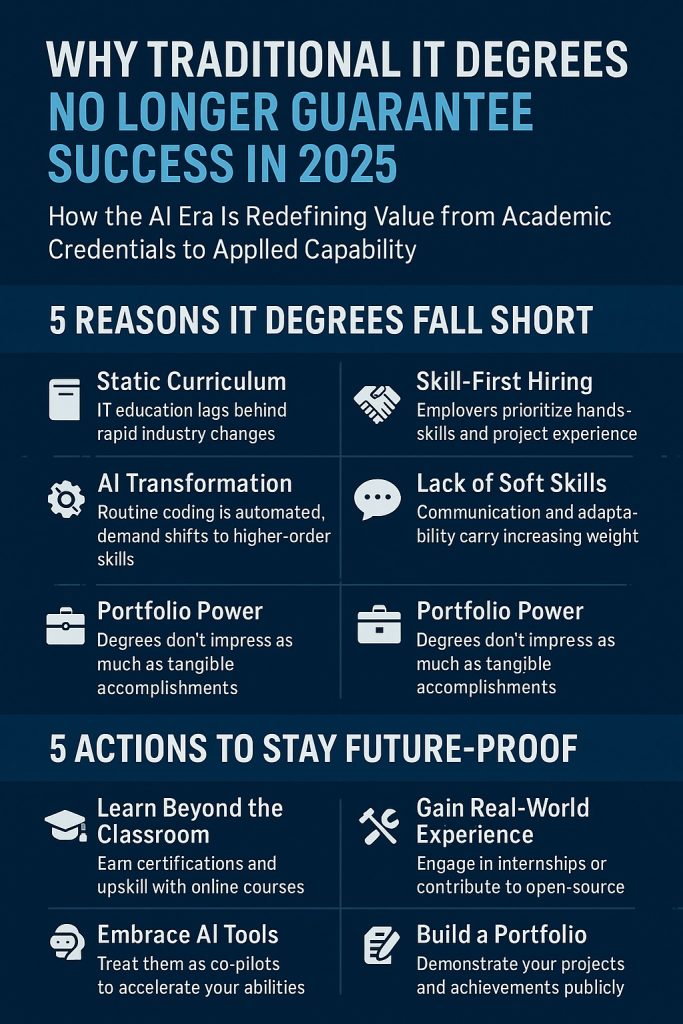
Why Traditional IT Degrees No Longer Guarantee Success in 2025
 Why Traditional IT Degrees No Longer Guarantee Success in 2025
Why Traditional IT Degrees No Longer Guarantee Success in 2025
The future doesn’t need more graduates. It needs more builders.
 The Changing Landscape of IT Education
The Changing Landscape of IT Education
For decades, an IT degree was the gold standard — a ticket to stable jobs and professional identity. But as we enter 2025, the ground beneath the tech industry has shifted dramatically.
Today’s IT employers don’t just seek graduates — they seek problem solvers, creators, and innovators who can adapt to a world powered by AI, automation, and real-time learning.
In this evolving era, the value of a degree lies in what you can do with it — not just the certificate itself.
 The Core Problem: Static Curriculum vs. Dynamic Industry
The Core Problem: Static Curriculum vs. Dynamic Industry
Traditional IT curricula still teach programming languages, database theory, and network basics — all valuable foundations.
However, the tech industry evolves every 6–12 months, while academic programs often update every 4–5 years.
This creates a widening skills gap:
- Students graduate fluent in outdated tools or languages.
- Emerging domains like AI, DevOps, data engineering, cybersecurity, and cloud-native architecture remain barely covered.
- Graduates lack hands-on exposure to industry-scale projects or collaboration workflows (Git, Agile, CI/CD).
 Result: Employers hire based on skills, portfolios, and adaptability — not transcripts.
Result: Employers hire based on skills, portfolios, and adaptability — not transcripts.
 The Rise of Skill-First Hiring
The Rise of Skill-First Hiring
In 2025, tech hiring is becoming skill-verified, not degree-dependent.
Platforms like LinkedIn Learning, Coursera, AWS Academy, and GitHub now act as skill passports, where demonstrable projects and certifications carry more weight than university marks.
Leading tech firms — from Google to Infosys — are adopting “Skills over Degrees” hiring policies.
What they look for now:
- Can you solve a real-world problem using Python, React, or AI models?
- Do you understand APIs, integrations, and data pipelines?
- Have you collaborated on open-source or GitHub projects?
 Key Insight: Employers trust evidence of competence, not assumptions of competence.
Key Insight: Employers trust evidence of competence, not assumptions of competence.
 The AI Revolution Has Changed Expectations
The AI Revolution Has Changed Expectations
The emergence of AI copilots, chatbots, and code generators (like GitHub Copilot and ChatGPT) has redefined what “IT work” even means.
Routine coding, report generation, or data extraction are now semi-automated — shifting the demand toward higher-order skills:
- System design and architecture thinking
- Business process understanding
- Prompt engineering and AI model fine-tuning
- Ethical data governance and responsible AI practices
 In essence: The future IT professional is part coder, part analyst, part problem architect.
In essence: The future IT professional is part coder, part analyst, part problem architect.
 Soft Skills and Interdisciplinary Thinking Matter More
Soft Skills and Interdisciplinary Thinking Matter More
A purely technical degree no longer suffices in an era of cross-functional innovation.
Employers now assess:
- Communication and presentation clarity
- Collaboration across remote/global teams
- Adaptability to new tools and rapid learning
- Critical thinking and user empathy
An AI engineer who can explain insights to non-technical leaders will always outshine a coder who can’t articulate the “why.”
 Certifications, Projects, and Portfolios Are the New Currency
Certifications, Projects, and Portfolios Are the New Currency
Students today must build their own digital credibility.
Here’s what employers increasingly value:
- Industry certifications: AWS, Azure, Google Cloud, Cisco, Salesforce, or cybersecurity credentials.
- Project portfolios: GitHub repositories, open-source contributions, or freelance implementations.
- Hackathons and internships: Real-world problem-solving under time and teamwork constraints.
- Mini-case studies: Documented applications of AI, ML, or automation in simple but tangible use-cases.
These elements showcase your capability in context, something a mark sheet never can.
 The Hybrid Future of Learning: Continuous, Modular, Self-Driven
The Hybrid Future of Learning: Continuous, Modular, Self-Driven
In 2025, the most successful IT professionals are lifelong learners.
Formal education still matters — but it’s no longer enough.
The future belongs to students who:
- Continuously upskill via micro-courses and certifications,
- Learn from communities (Reddit, GitHub, Stack Overflow, Kaggle),
- And treat AI tools as co-learners, not competitors.
 Shift your mindset from “graduate once” to “learn always.”
Shift your mindset from “graduate once” to “learn always.”
 The Right Way Forward: Rebuilding the IT Learning Model
The Right Way Forward: Rebuilding the IT Learning Model
If you are currently pursuing or planning an IT degree, don’t abandon it — redefine it.
Make your formal education the foundation, not the ceiling.
Here’s your modern IT success formula (2025–2030):
| Pillar | What It Means | Action |
|---|---|---|
| Core IT Knowledge | Theoretical understanding of systems, databases, algorithms | Retain strong fundamentals |
| Hands-on Skills | Tools, frameworks, and cloud platforms | Practice in labs & real projects |
| AI & Data Literacy | Understanding how AI transforms your domain | Learn AI integration basics |
| Portfolio Evidence | Publicly visible work (GitHub, projects) | Showcase problem-solving |
| Continuous Learning | Adaptive self-development | Take at least one micro-course each quarter |
 Final Word: Degrees Don’t Define You — Skills Do
Final Word: Degrees Don’t Define You — Skills Do
The IT degree of yesterday opened doors.
The IT professional of tomorrow builds their own.
Academic credentials remain valuable — but only when powered by application, curiosity, and adaptability.
AI has democratized learning; knowledge is now abundant. What defines you is how you apply, innovate, and evolve.
“In 2025, your degree will tell the world what you started learning. Your skills will tell the world who you’ve become.”
 Guidance Summary for Students
Guidance Summary for Students
| Old Mindset | New Mindset (2025 and Beyond) |
|---|---|
| Earn a degree → get a job | Learn skills → build career pathways |
| Focus on grades | Focus on outcomes and portfolios |
| Learn once | Learn continuously |
| Compete locally | Collaborate globally |
| Depend on curriculum | Design your own learning roadmap |
Conclusion
The IT industry hasn’t outgrown education — it has outgrown stagnation.
To thrive in 2025, blend your degree with curiosity, continuous learning, and creative problem-solving.
The future doesn’t need more graduates. It needs more builders.
